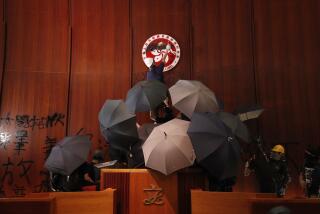Mainland Chinese in Hong Kong watch protests with interest
On a vacation to Hong Kong last week, one couple from Shandong province, China, made sure to take pictures of something they can’t see on the mainland: pro-democracy political signs. And their must-have souvenir was a copy of Apple Daily, an anti-Chinese Communist Party local newspaper that is banned on the mainland and has been providing cover-to-cover news on the territory’s student-led protests.
The protest movement is agitating against rules imposed by Beijing authorities that would limit voters’ choices in Hong Kong’s 2017 election for chief executive, the territory’s top official. The movement, which was presaged by a weeklong university student strike, has brought massive sit-in demonstrations after police tried to disperse unarmed protesters with tear gas.
“I have every reason to believe they’re forced by the circumstances to resort to radical methods,” said the husband, a 30-year-old MBA student who would give only his family name, Ma, for fear of reprisals from government officials.
Though mainland censors have worked hard to ensure Chinese citizens see only state-run media reports about the Hong Kong demonstrations, Ma and his wife, Jin, 28, have been keenly interested in the developments. They said they had managed to keep tabs on the protests to some extent via online news sources without circumventing China’s so-called Great Firewall, which has largely blocked mentions of the Hong Kong upheaval.
The couple said they very much support the Hong Kongers’ cause. Only because Jin is four months pregnant did they decide against visiting the sit-in zones to extend their support to the protesters in person. In one neighborhood, fistfights broke out Friday between protesters and opponents trying to remove their encampment by force.
Such sympathy toward the Hong Kong protesters may prove disconcerting to China’s communist rulers. Allowing Hong Kongers to hold free and fair elections, the leaders fear, could give mainland Chinese the dangerous idea of demanding the same.
“Beijing is worried that Hong Kong will become an example for mainlanders of how an opposition movement can demand democratization,” said Dixon Ming Sing, associate professor of social science at the Hong Kong University of Science and Technology.
That said, Ma, Jin and several other mainland Chinese who were interviewed about the protests here said they don’t see any possibility that their fellow citizens would follow Hong Kong’s example should the semiautonomous territory be given unfettered democracy.
“The Hong Kong people have a greater will to fight for their political future than those of us in the mainland,” Jin, a doctor, said admiringly. The couple lamented that most mainland Chinese students are so “brainwashed” by the education system that there’s little chance they’d ever ponder political action.
Other mainlanders said they were prepared to wait longer than Hong Kongers for political change.
Patience, rather than action, is what Huang Le, 30, believes might best bring about democracy.
“I certainly understand the students’ ideals,” said Huang, who runs his own steel products trading company in Guangzhou, a southern Chinese city two hours’ drive from Hong Kong. “And I, too, hope to see the day when I can vote for my city’s mayor.”
His empathy and hope aside, Huang believes that in mainland China, democratization should be gradual and be allowed to proceed in due course. For now, he’s content with the vote he gets as a homeowner in selecting the residents committee in his housing development. “But if the students succeed,” Huang said, “I’ll be most happy for them.”
A 23-year-old senior at Hong Kong University surnamed Hsieh, is far more pessimistic about democracy spreading northward anytime soon. But he said Hong Kong students should have done more to reach out to mainland classmates like him.
Hsieh, a mathematics major from Shanghai, is among the growing number of mainlanders pursuing higher education in Hong Kong.
Up to 10% of undergraduates at Hong Kong colleges and more than 60% of graduate students hail from the mainland. But university student leaders mobilizing for their strike last month made little effort to reach out to mainland Chinese students such as Hsieh. Student leaders conducted their meetings in Cantonese, a dialect unintelligible to most mainlanders, and didn’t offer interpretation in Mandarin.
That’s because, Hsieh believes, “the students here feel a sense of aloofness and superiority over the mainland students.”
Even before he was excluded from the student-led protest movement on his campus, though, Hsieh was schooled by his parents on the futility and hazard of such movements. In 1989, during the student uprising in Tiananmen Square in Beijing, his parents were active on a college campus near Shanghai until their hopes and dreams for a democratic China were crushed by tanks.
“Street protests don't work,” said Hsieh, “and I refuse to be exploited.”
His sense of exclusion notwithstanding, he said, “I’ve been in Hong Kong long enough to know the students are fighting for a righteous cause.” And even though Hsieh wouldn’t have participated regardless, he said the local student leaders would have been smart to reach out to the vast community of mainland students.
“By not involving the mainlanders,” Hsieh said, “the student leaders are missing a great opportunity to enlighten them.”
Law is a special correspondent.
More to Read
Start your day right
Sign up for Essential California for news, features and recommendations from the L.A. Times and beyond in your inbox six days a week.
You may occasionally receive promotional content from the Los Angeles Times.






